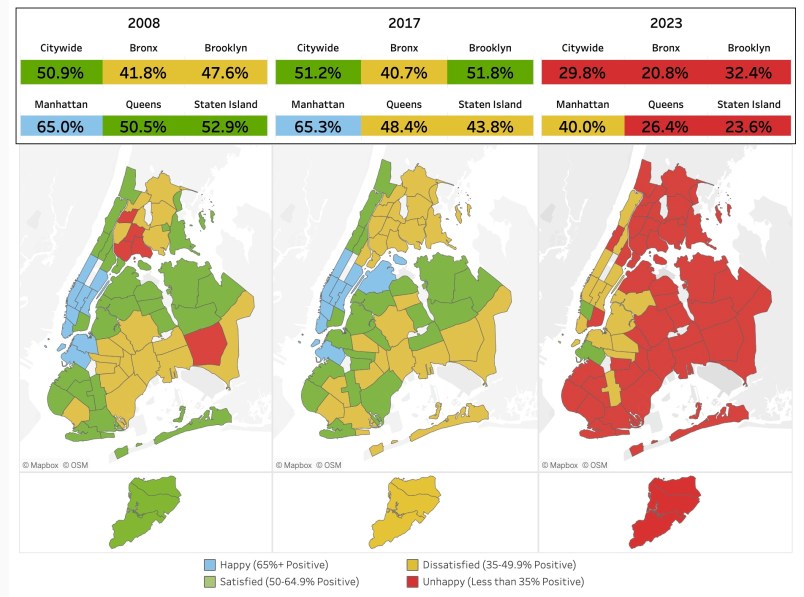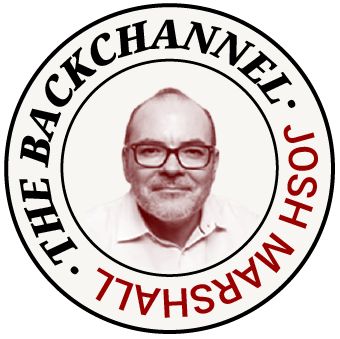The chart below is from something called the CBC 2023 Resident Survey. It’s a survey of New York City residents in which residents share their opinion about the city’s quality of life and government services. It purports to be “the most comprehensive, statistically valid, post-pandemic view into how New Yorkers feel about the City’s quality of life and how they rate City government services.” For the purposes of this discussion, I am going to assume the claim about statistical validity is accurate. And most importantly, it says that the methodology used in the previous two surveys is roughly the same, thus giving us some fair measure of change over time.
Needless to say, the change from 2008 and 2017 to 2023 is quite stark.

When I first saw this chart on Twitter this morning, it was used to suggest that former Mayor Bill Blasio’s tenure was greatly underrated, especially in comparison to Mayor Eric Adams’ weird and seemingly corrupt government. (DeBlasio left office at the end of 2021.) I always thought that was the case, though I totally soured on DeBlasio, fairly or unfairly, because of his management of the COVID crisis during the first months of the crisis.
But none of that is why I’m sharing this with you this morning. New York is its own special beast. This could be seen as a judgment on the current mayor, Adams. But to me it is a microcosm of the country as a whole. You may have heard various things about how post-2020 New York City became a progressive, crime-ridden hellhole. But by concrete metrics, the city is doing quite well — economically, in terms of crime, and other basic quality-of-life measures. In other words, it is comparable to the country as a whole, which is to say that while what we might call vibes are middling at best, by the benchmarks we as a society have used for many decades things are going pretty well. For what it’s worth, while I wouldn’t call it a hellhole, at least on a good day, I also feel like the quality of life in the city has gotten worse, though in ways that I would say are ebbing.
You can see some additional things if you break the neighborhoods down. As you can see across the 15-year period, people always think things are pretty good in Manhattan and it’s a much more hit-or-miss thing in the outer boroughs. That pattern is stable, though there’s common agreement that things are worse everywhere.
I don’t have any specific insight to share other than the general observation that I do not think we as a society — or certainly in the area of public commentary — have sufficiently grappled with the totality of the dislocating impact of the COVID pandemic in a way that transcends conventional economic and quality-of-life measurements and will likely have a longer half-life than we assume.
Of course it’s not like we’ve forgotten about the pandemic. In a way we talk about it all the time. We’re still litigating who did what right or wrong. Only maybe in the last six months or so does it feel like even that is starting to recede. I’m hearing a bit less relitigating of school closures, or Tony Fauci, or lab leaks. But it’s simply much more global than that. This was a massive trauma and economic dislocation and substantial loss of life that shook the entire society and we simply have not recovered from that. And I think if we were to step back and look at the same general set of facts at a period more distant in the past this would seem commonsensical. It would make perfect sense.
I think we can add to this that there are other, longer-term trends in our society which also seem negative and potentially intractable — climate change, threats to democracy and political stability in the United States, the erosion of America’s global primacy. So you have a crisis which is traumatic in itself but also calls into question society’s basic resilience and you come out of it facing more crises, albeit slower-motion ones, that call for as much or more resilience.
This isn’t, believe it or not, a counsel of pessimism. People and societies have crises and they bounce back from them. But they don’t always bounce back immediately. And I think that explains some of the mysteries we have about the current moment. I’m thinking of things like the polls that show continuing pessimism about the economy when actually the economy, by conventional metrics, seems to be doing pretty great. Maybe it’s not bad polling or people suddenly deciding they don’t like the scourge of neoliberalism. Maybe people are still in a bit of shock because of the legitimately awful and bewildering thing we just went through. And “just” really does make sense. The big aftershocks lasted at least through 2022 and arguably continue until today.
I was having a conversation with someone recently about the Biden-Trump polls. And I explained to them that to a significant extent many people think of the Trump years as before the pandemic. In other words, when everything was kind of better. That’s absurd, this person said. The pandemic happened on Trump’s watch. And the worst of it — both in mortality and economic distress — all happened when he was President. That’s of course 100% right. 2020 was the worst year. But that’s too literal a way of looking at it. Joe Biden has been President for three years. And all three have been in the things-kind-of-suck era.
Again, this isn’t a counsel of pessimism. My sense is that there is the beginning of a shift. But I think a lot of things come into focus if we fully absorb this reality about the aftershocks and half-life of one of the greatest social and economic convulsions of the last century.


 Member Newsletter
Member Newsletter